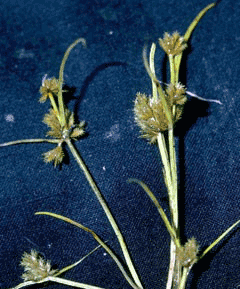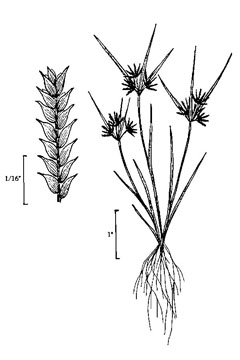 |
|
USDA-NRCS PLANTS Database |
 |
| USDA-NRCS PLANTS Database / USDA NRCS. Wetland flora: Field office illustrated guide to plant species. USDA Natural Resources Conservation Service. |
Translate this page:
Summary
Physical Characteristics

 Cyperus aristatus is a PERENNIAL growing to 1.5 m (5ft).
Cyperus aristatus is a PERENNIAL growing to 1.5 m (5ft).
See above for USDA hardiness. It is hardy to UK zone 8. The seeds ripen from July to August. The species is hermaphrodite (has both male and female organs).
Suitable for: light (sandy) and medium (loamy) soils. Suitable pH: mildly acid, neutral and basic (mildly alkaline) soils. It cannot grow in the shade. It prefers moist or wet soil.
UK Hardiness Map
US Hardiness Map
Synonyms
C. inflexus. Muhl. C. squarrosus. L.
Habitats
Bog Garden;
Edible Uses
Edible Parts: Root
Edible Uses:
Tuber - raw or cooked[46, 161, 177]. A starchy flavour[61].
References More on Edible Uses
Medicinal Uses
Plants For A Future can not take any responsibility for any adverse effects from the use of plants. Always seek advice from a professional before using a plant medicinally.
None known
References More on Medicinal Uses
Now available: PLANTS FOR YOUR FOOD FOREST: 500 Plants for Temperate Food Forests and Permaculture Gardens.
An important new book from PFAF. It focuses on the attributes of plants suitable for food forests, what each can contribute to a food forest ecosystem, including carbon sequestration, and the kinds of foods they yield. The book suggests that community and small-scale food forests can provide a real alternative to intensive industrialised agriculture, and help to combat the many inter-related environmental crises that threaten the very future of life on Earth.
Read More
Other Uses
Weaving
The leaves are used for weaving hats, matting etc[178].
Special Uses
References More on Other Uses
Cultivation details
We have very little information on this species and do not know if it will be hardy in Britain, though judging by its native range it could succeed outdoors in many parts of this country. There is some confusion over the correct name of this species, we have shown C. squarrosus as a synonym but it could be the correct name, whilst some botanists say that C. inflexus is the correct name[235]. The dried plant is fragrant[235]. The following notes are based on the general needs of the genus. Prefers a moist sandy loam[95, 117].
References Carbon Farming Information and Carbon Sequestration Information
Temperature Converter
Type a value in the Celsius field to convert the value to Fahrenheit:
Fahrenheit:
The PFAF Bookshop
Plants For A Future have a number of books available in paperback and digital form. Book titles include Edible Plants, Edible Perennials, Edible Trees, and Woodland Gardening. Our new book to be released soon is Edible Shrubs.
Shop Now
Propagation
Seed - surface sow in the spring and keep the compost moist[164]. The seed usually germinates in 2 - 6 weeks at 18°c[164]. Prick out the seedlings into individual pots as soon as they are large enough to handle. Grow on for their first winter in a greenhouse and plant them out in late spring after the last expected frosts. Division in spring or autumn. This is more a matter of harvesting the tubers and replanting them. If this is done in the autumn, then it is best to store the tubers in a cool frost-free place overwinter and plant them out in the spring.
Other Names
If available other names are mentioned here
Native Plant Search
Search over 900 plants ideal for food forests and permaculture gardens. Filter to search native plants to your area. The plants selected are the plants in our book 'Plants For Your Food Forest: 500 Plants for Temperate Food Forests and Permaculture Gardens, as well as plants chosen for our forthcoming related books for Tropical/Hot Wet Climates and Mediterranean/Hot Dry Climates. Native Plant Search
Found In
Countries where the plant has been found are listed here if the information is available
Weed Potential
Right plant wrong place. We are currently updating this section.
Please note that a plant may be invasive in one area but may not in your area so it’s worth checking.
Conservation Status
IUCN Red List of Threatened Plants Status :

| Related Plants
|
| Latin Name | Common Name | Habit | Height | Hardiness | Growth | Soil | Shade | Moisture | Edible | Medicinal | Other |
| Cyperus articulatus | Jointed flatsedge, Priprioca, Piripiri | Perennial | 1.8 |
10-12
| F | LMH | N | MWeWa | 1 | 4 | 2 |
| Cyperus cephalotes | Bhada, Flat Sedges, Nut Sedges or Umbrella Sedge. | Perennial | 0.3 |
10-12
| F | LMH | N | WeWa | 0 | 1 | 2 |
| Cyperus distans | Slender Cyperus, Piedmont flatsedge | Perennial | 0.5 |
0-0
| | LM | N | MWe | 1 | 1 | 2 |
| Cyperus esculentus | Tiger Nut, Yellow nutsedge, Nut Grass | Perennial | 0.9 |
8-10
| F | LMH | N | MWe | 4 | 2 | 3 |
| Cyperus fendlerianus | Fendler's Flatsedge | Perennial | 1.5 |
-
| | LM | N | MWe | 2 | 0 | 2 |
| Cyperus giganteus | Piripiri, Mexican Papyrus | Perennial | 1.5 |
9-11
| F | LMH | N | WeWa | 0 | 2 | 3 |
| Cyperus longus | Galingale | Perennial | 1.2 |
6-9
| F | LMH | N | MWeWa | 2 | 1 | 3 |
| Cyperus papyrus | Papyrus. Papyrus sedge | Perennial | 5.0 |
9-12
| F | LMH | N | WeWa | 2 | 2 | 2 |
| Cyperus rotundus | Nut Grass | Perennial | 0.6 |
0-0
| | LM | N | MWe | 3 | 3 | 2 |
| Cyperus schweinitzii | Flatsedge, Schweinitz's flatsedge | Perennial | 0.8 |
0-0
| | LM | N | MWe | 2 | 0 | 2 |
| Cyperus setigerus | Lean flatsedge | Perennial | 1.0 |
0-0
| | LM | N | MWe | 2 | 0 | 2 |
| Cyperus tegetiformis | | Perennial | 0.0 |
-
| | LM | N | MWe | 0 | 0 | 2 |
| Cyperus textilis | Flat sedge, Basket grass, | Perennial | 1.5 |
9-12
| F | LMH | FSN | MWeWa | 0 | 0 | 4 |
| Cyperus ustulatus | | Perennial | 1.2 |
-
| | LM | N | MWe | 0 | 0 | 2 |
|
Growth: S = slow M = medium F = fast. Soil: L = light (sandy) M = medium H = heavy (clay). pH: A = acid N = neutral B = basic (alkaline). Shade: F = full shade S = semi-shade N = no shade. Moisture: D = dry M = Moist We = wet Wa = water.

Expert comment
Author
Rottb.
Botanical References
60235270
Links / References
For a list of references used on this page please go here
Readers comment
| Add a comment |
|
If you have important information about this plant that may help other users please add a comment or link below. Only comments or links that are felt to be directly relevant to a plant will be included. If you think a comment/link or information contained on this page is inaccurate or misleading we would welcome your feedback at [email protected]. If you have questions about a plant please use the Forum on this website as we do not have the resources to answer questions ourselves.
* Please note: the comments by website users are not necessarily those held by PFAF and may give misleading or inaccurate information.
To leave a comment please Register or login here All comments need to be approved so will not appear immediately.
|
Subject : Cyperus aristatus
|
|
|
|